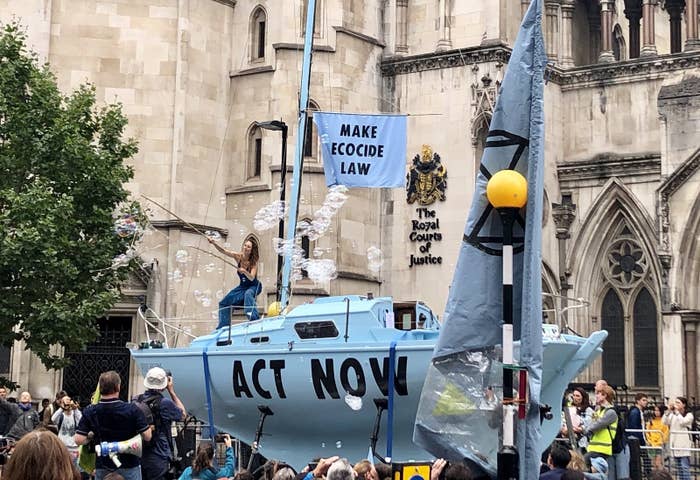Demonstrators disrupt five UK cities calling for legal recognition of ‘ecocide’ as an international crime.

Hazel Shearing / BuzzFeed News
London – As activists erected the mast of a boat emblazonedwith “act now”, hundred of climate change protesters gathered in front of the vessel blocking traffic on The Strand, one of the UK capital’s major arteries.
A similar boat, now a symbol of the Extinction Rebellion protests, blocked Piccadilly Circus in April when the climate activist group brought much of London to a standstill for 10 days.
The group kicked off a new round of demonstrations across the UK on Monday targeting five cities – London, Glasgow, Cardiff, Bristol and Leeds – with creative and civil disobedience action through to Friday.
They aim to cause disruption to raise awareness of the climate crisis and urge the government to enact policy measures aimed at achieving a net-zero carbon footprint by 2025. Action in each city focuses on a different theme, including “climate refugees” and rising sea levels.
In London, protesters at the Royal Court of Justice demanded the “legal system take responsibility in this crisis” and called for “ecocide” to become an internationally recognised crime.
“At the moment, the damage and destruction to our planet that continues day by day does so because it’s permitted,” Jojo Mehta, director of a campaign called “Stop ecocide: change the law”, told Al Jazeera.
Mehta, a longtime environmental activist, cofounded the campaign with Polly Higgins, a lawyer who died of cancer in April after spending a decade calling for ecological damage to be criminalised, so governments and corporations that are responsible could be held to account.
‘An achievable route’
She said such criminalisation could be “straightforward” at the international level. It would require an amendment to the Rome Statute, the treaty that established the International Criminal Court, adding ecocide to a list of existing international crimes.
“Any head of state that is a member, no matter how small, can propose an amendment to the Rome Statute, and there’s no veto to that,” Mehta explained.
“Once it’s tabled, it’s just a question of adding signatures. It’s an achievable route,” she added, before being called on board the boat, named after her friend, to deliver a speech.
Extinction Rebellion protesters block The Strand in central London [Ylenia Gostoli/Al Jazeera]
As performers and speakers hit an improvised stage, some activists made banners while others glued their arms together, linking their hands with a black tube symbolising an oil pipe. Five police vans were positioned on the road nearby, blocking their route to Waterloo Bridge.
Following Extinction Rebellion’s previous round of climate protests, the UK Parliament declared a “climate emergency”, passing a non-legally binding motion tabled by Labour leader Jeremy Corbyn.
In June, the UK was the first country to commit to achieving carbon neutrality by 2050 – either by avoiding emissions or offsetting them with projects aimed at soaking up carbon dioxide. But Extinction Rebellion called this target too little, too late. MORE
RELATED:
“I think it’s as bad as killing people. We’re making our planet uninhabitable.”
Extinction Rebellion protest news LIVE: Climate activists take to streets in London, Glasgow, Cardiff …






![Extinction rebellion protest - London High Court - 15/07/2019 [Ylenia Gostoli] Extinction rebellion protest [Ylenia Gostoli]](https://www.aljazeera.com/mritems/Images/2019/7/15/65c2c893c27548f3af9293b6504375c8_6.jpg)
